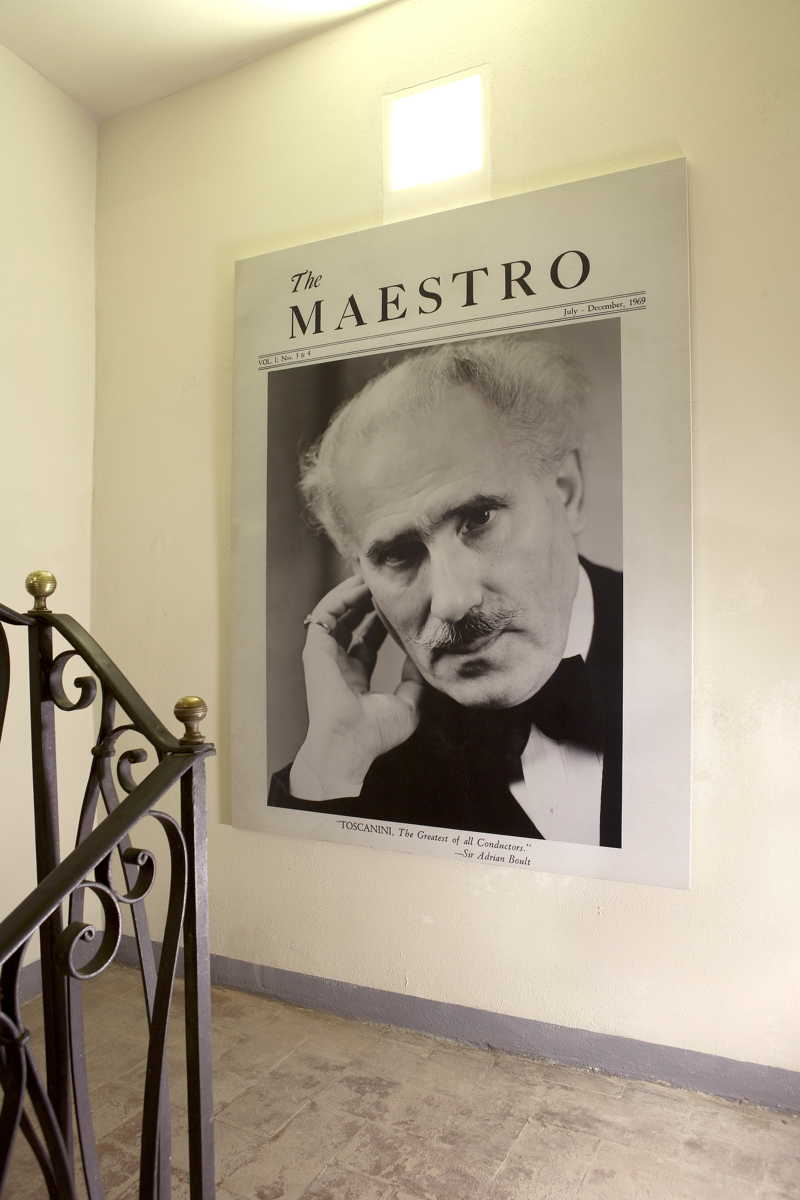Arturo Toscanini

Arturo Toscanini nasce a Parma il 25 marzo 1867 in una famiglia di patrioti (il padre, sarto di professione, era un garibaldino che aveva affrontato la guerra e il carcere) e di appassionati di musica lirica. Dimostrata fin dalla tenera età una grande disposizione musicale, Arturo diviene allievo interno (convittore) della Regia Scuola di Musica dove studia armonia, composizione e violoncello diplomandosi con lode. Nel 1886, durante una tournée in Brasile, è chiamato all’improvviso a sostituire il direttore d’orchestra Leopold Miguéz. Dirige a memoria Aida - non ha che diciannove anni - ed è l’inizio di una carriera che non avrà eguali. Dopo esperienze anche in piccoli teatri, dal 1895 è chiamato al Regio di Torino dove dirige la prima della Bohème di Puccini.
I successi torinesi (nel 1897, intanto, aveva sposato Carla de Martini) gli aprono le porte del Teatro alla Scala, creando quello che sarà per oltre mezzo secolo un binomio pressoché inscindibile - seppure con alcuni periodi di distacco, talvolta lunghissimi - tra il Maestro e il massimo tempio della lirica italiana.
Nei primi anni del ‘900, Toscanini viene chiamato a New York dove dirige al Metropolitan affiancando all’inizio Gustav Mahler: tra i tanti trionfi nel grande teatro americano, la prima assoluta della Fanciulla del West di Puccini.
Durante la Prima Guerra Mondiale Toscanini, ostile alla politica tedesca, organizza concerti di beneficenza e, durante l’attacco al Monte Santo, dirige la banda dell’esercito rimanendo al fronte fino alla rotta di Caporetto.
Antifascista convinto, nel 1931 a Bologna viene colpito da alcuni facinorosi per essersi rifiutato di dirigere la Marcia Reale e l’inno fascista.
Nel 1936 inaugura in Israele la neonata Orchestra di Palestina. Nel 1937 a New York la RCA crea per il Maestro un’orchestra destinata a trasmissioni radiofoniche e successivamente anche televisive, e le cui interpretazioni attraverseranno il mondo.
Nel 1946, dopo la Seconda Guerra Mondiale, Toscanini rientra in Italia per dirigere il concerto inaugurale della Scala ricostruita dopo i bombardamenti. Seguono molti impegni e progetti, ma la salute precaria lo costringe a lunghi periodi di riposo.
Il 16 gennaio 1957, in seguito ad una trombosi cerebrale, Toscanini muore nella sua villa di Riverdale, presso New York.
Arturo Toscanini was born in Parma on 25 March 1867 into a family of patriots (his father, a tailor, was a garibaldino and he had experienced war and prison) and opera-lovers. Demonstrating his musical ability at an early age, Arturo became a pupil at the Royal School of Music, where he studied harmony, composition and cello, and graduated with honours. During a tour to Brazil in 1886, he was suddenly required to stand in for the conductor Leopold Miguéz. Aged only nineteen years, Toscanini conducted Aida by heart: it was the beginning of an unparalleled career. After experience in minor theatres, he was appointed to conduct the première of Puccini’s La bohéme inTurin in 1895.
His successes in Torino (in 1897 he married Carla De Martini) opened him the doors of Teatro alla Scala: it will be created an indissoluble partnership between Toscanini and the most important temple of Italian opera, notwithstanding the frequent, and at times very long, periods of absence of the Maestro from the Theatre.
During the early twentieth century, he was invited to New York, where he conducted at the Metropolitan alongside, at first, Gustav Mahler: his many triumphs in the American theatre included the première of Puccini’s La fanciulla del West. During the First World War, Toscanini - hostile to German politics - organized benefit concerts and, during the attack on Monte Santo, he conducted a military band at the front until the collapse of Caporetto.
A stalwart anti-fascist, he was physically attacked by thugs in Bologna in 1931 for having refused to conduct the Royal March and the fascist anthem.
In 1936, he inaugurated the new Orchestra of Palestine in Israel. A year later in New York, the RCA created for the Maestro an orchestra (the NBC Orchestra) destined to produce transmissions for radio, in a second time also for television, via which his performances travelled the whole world. After the war, Toscanini returned to Italy in 1946 to conduct the inaugural concert at La Scala, newly reconstructed after bombings.
Many engagements and projects followed, but Toscanini’s precarious health compelled him to long periods of rest. On 16th January 1957, after a cerebral thrombosis, Toscanini died in his villa, Riverdale, in New York.